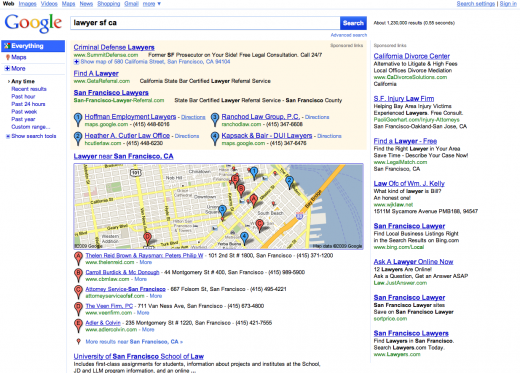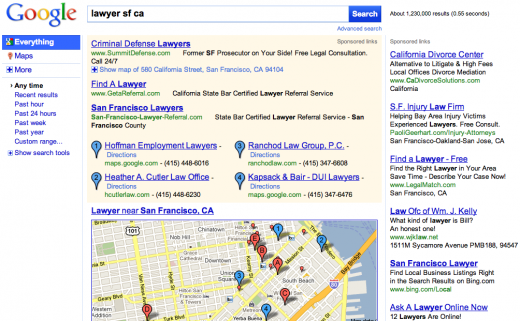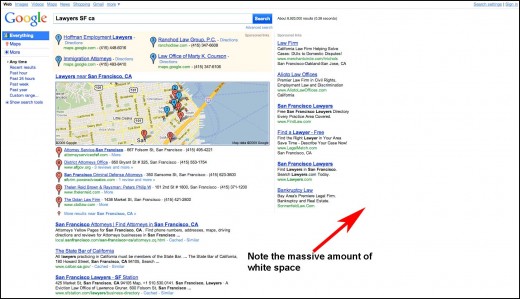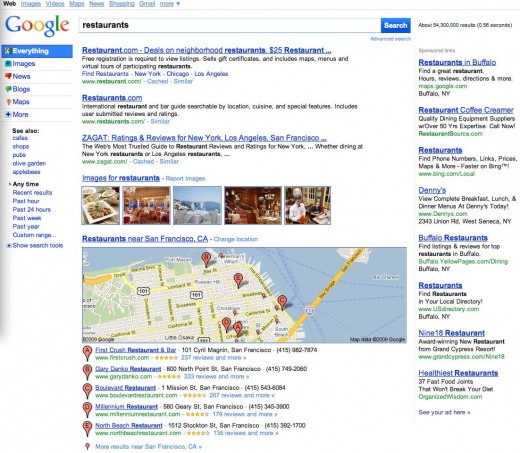Understanding Google My Business & Local Search
Google New UI + Local Listing Ads – What Does It Mean for Local?
Since the third week of November, Google has been testing a new streamlined interface for its main search page that offers a 3 pane view and a more guided experience. As Malcolm Coles pointed out over the weekend, this new view comes with a significant adjustment in the display of the Local Universal results, downshifting once again and now only showing 5 results instead of the Lucky 7- Pack.
In the new UI, the map is now wider, the local listings are shown below the Map and an obvious pin to a Map centric view is visible along the left menu. In an of itself, the change means more SEO competition for fewer spots. Whether the change will drive more people into Maps is unclear as highlighted Map pin is offset by fewer links into Maps.
Along with the new UI testing, Google is also testing their new Local Listing Ads display. The Local Listing Ads have been rolling out amongst more business categories in the San Francisco and San Diego markets and it seems only a matter of time when the viewable area above the fold on the main Google results page will include both the new UI and Local Listing Ads.
I was curious to see how the combination of new UI and LLAs would be presented on various screen sizes, what would be visible and what would be pushed below the fold.
Screen size 1024 x 768 (click to view larger):
——————————————————————————————
Screen size 1280 x 1024 (click to view larger):

——————————————————————————————
Screen size 1920×1200 (click to view larger):
——————————————————————————————
It is curious to me that on large displays that Google would leave so much whitespace. Maybe we will start seeing two columns of ads shortly.
Broad local search with no geo-modifier (click to view larger):
——————————————————————————————
Change is obviously in the wind. Whether what we are seeing today will be what actually gets rolled out it, is unclear.
What do you think will be the impacts of these changes?
P.S. In case you missed it, Google Blogoscoped has instructions on how to enable the new view so that you can test your own query.
© Copyright 2025 - MIKE BLUMENTHAL, ALL RIGHT RESERVED.




Comments
33 Comments
Nice post and thanks for doing the work to see how this would appear at different resolutions.
I think these changes will make people even less likely to go past the first page of search results with even more things to grab their attention and divert them elsewhere. This is obviously in Google’s best interest as they continue to monetize page 1 of the SERPs more and more.
Google is not entirely evil, but they’re getting more and more greedy which will make SEO even more difficult and eventually out of reach for SMBs. That leaves them little choice but to choose one of Google’s paid options to get some visibility…
Mike,
Interesting news. I am not convinced however this is anywhere near the ‘winning’ combination we will see in days/weeks to come. Considering the obvious major flaws and misuse of open space, this may be just one of thousands of versions we will see – I hope.
I would like though to see some type of local listing that expands on the screen so for those who want it, can see it and for those who don’t want their natural results interrupted can hide it.
Overall, excellent review and nice article. I’ve RT’ed and passed along to my colleagues.
@coreyeulas
Hmm…okay, I see where they’re going…least this iteration….but what I’m wondering is “when” the timeline for these designs is over…ie when will they roll it out globally….so that we can fight to get clients included in same…
Anyone have an answer for that query?
Jim
Hi Brian
Do you think the obvious menu choices to the left will motivate users to explore the other products more deeply?
AS Google growth from users has slowed they have achieved growth by monetizing many of the previous nooks and crannies of their products with ads…
Evil have never been a good explanation of Google pursuing their self interest. But as they fill every available space with ads, and they impinge on the interests of the SMB and searcher, I am sure find that there is a limit to how many ads they can show with their given real estate without a loss of users and business discontent.
I agree with Brian. This could potentially lead to some issues for SMBs. Local search is on the rise and this trend to try and monetize the first page, which great for Google, in my opinion will prove detrimental.
In an attempt to monetize the first page I think Google will eventually harm the user experience. Isn’t the user experience the whole point? I know as an avid searcher, and even before I was in the SEO biz, I hated the paid ads. I looked for more organic listings above all others. I put a greater value on the small local business than the large chain that can afford to buy adspace.
Hopefully Google will realize that knocking it down from a 7 pack to a 5 pack has a greater impact on user experience.
@Mike
Great follow-up post to your other LLA posts. There is a reason Google is one of the most dominating companies around, they take selective data and make sure it works how they want it to before rolling it out across all fronts.
What amazed me was how far down the page they are starting to push the organic listings. This is one indicator that search is definitely going local. Another reason they might be selectively changing the algorithem based on different locations because it might be possible that keyword searches differ in separate countries? Same reason Yahoo is the leading search engine in Japan (54%), local customs and search variations?
@Brian
I think you are in part right that people will be less motivated to go to page 2 especially with local searches. I do not think this will have a major impact on non geo-specific searches.
@Kaila
Google has so much data to make sound decisions from I sincerely doubt they will harm the user experience. They can tell CTR’s on all of their ads, organic listings and this is the reason they only rolled out the LLA’s to SF and SD first, starting with professionals then working their way down the totem-pole. They will have plenty of data to make sound decisions.
Agree with Kaila here — this interface is not going to be a good user experience unless Google SERIOUSLY looks at relevancy in its PPC algorithms. To have the entire above the fold real estate dominated by ads isn’t going to happen. I tend to think this is more experimental than anything else.
Great post. thanks for all the fresh info. I posted something today about paid search and the BETA blue marker for local listing ads. http://www.localsearchpilot.com/local-search/google-local-listings
Do you have any insight on this?
Hi Jason
That’s a new adwords ad type that Google has been testing lately.
how are they determing which Ads get the marker? I have found no pattern thus far
Organic results, going, going, gone. Wow.
The top screenshot, what those with laptops would see, has ONLY paid results. Wow
@Jason
I have not even seen them yet so I don’t really know. Anyone?
@Stever
Have you ever seen Utah Phillips story of Moose Turd Pie…”but its good!”
Mike
another thing I’d like to mention is that the SERPs on a popular query “st louis heating contractors” has only 1 in 10 organic results that is an actual companies website.
More and more the paid results are the most relevant. Even the Local Business Listings (the 7 pack) are often way off base as I said here http://www.localsearchpilot.com/local-search/kitchen-cabinet-stores-st-louis
Typically the small business has a small budget for SEO and is usually not found on page 1 because a title tag of “Home” just wont get you ranked very high.
Local Listing Ads and PPC are there most cost effective way to get on page 1, if they’re not lucky enough to be chosen for the local business listings.
That too wont last forever. Google recently removed the Map Listings for queries related to local web designers, here today…yay…gone tomorrow…now what!?
Mike
great post once again
None of this shows up in Atlanta, so we will have to see. I did some research today on chiropractors and noticed that when I just use “chiropractor” the 7 pack was 3 spots down and the rest of the page was directories. Yet when I added the modifier chiropractor “chiropractor Atlanta” the 7 pack was top and the rest of the page was organic websites.
It makes me wonder what will happen when even less information shows up for local businesses?
Does anyone think that local directories will take up the slack for businesses that are being left out online?
@ Jan
the reason that the map moves up and down is because when you put in a geo Google determines your intent is “local” and so they put the local business listings first.
Adding the geo also changes the organic results and those local chiropractors have a much better chance of being selected as a relevant choice for you as opposed to just the query for “chiropractor” which yields results like Wikipedia definitions
@Jan
Does anyone think that local directories will take up the slack for businesses that are being left out online?
Are you asking if businesses will move to advertising in other on-line directories if they can’t or don’t get exposure on Google’s front page?
[…] Google New UI Local Listing Ads – What Does It Mean for Local?, Mike Blumenthal […]
Jason,
I’d challenge some of your comments from a UK perspective. I still find that whilst most SMB’s in the UK still don’t appreciate the full value of local search, for most searches local business listings are still on track in terms of relevance, simply because Google appears to be populating the local search listings with content pulled from mostly accurate local directory listings.
We are clearly at a different point on the curve in the UK, but paid results are generally way off the mark for local SMB searches and from a UK perspective presently just interference in a search for relevance and as such distrusted.
Whilst Local Listing Ads and PPC may be “the most cost effective way to get on page 1”, you have to wonder at their ROI in terms of actual clickthrough rates from a UK perspective?
I guess we are equally concerned in the UK about the changing Google environment and its impact on small budget SMB’s. What’s even more concerning from a UK perspective is that Google sees the UK as a parallel universe to the UK. I’m not sure it is.
Apologies…… got it wrong twice!
….parallel universe to the U.S.
Well, after a couple of recent trips I can say that the local and organic results are still pretty useless for local search in smaller cities. For example, if you’re looking for a good restaurant in town you have a hard time finding search results of any value – even if you’re dedicated and spend a few minutes.
Garbage directory listing sites with no meaningful content, and Trip Advisor, Restaurantica, etc. occupy the first 2 SERP pages. Even Trip Advisor type sites have relatively useless information (especially for cities less than 200,000) if you’re trying to book a respectable dinner reservation.
So an argument can be made that local businesses using PPC and local PPC probably have a bit more “on the ball” (and yes, maybe more money) and should maybe dominate the SERPS for local search at this point.
I hope they move this to a more world wide arena!
This is pathetic for all SEO experts……..
@ o-v : what’s pathetic?
Ohhhh i get it , you mean the guys posting purely for links lolzroflmao
West Los Angeles Chiropractor
The layout is interesting and I would bet that it would drive more users into the options offered in the left nav. but, overall, the presentation is starting to remind me of those bad Adsense sites in which nothing but ads are displayed above the fold, with the content you actually want being shoved way down the page. I’m always running into websites that are supposed to be focused on serious subjects (like medical topics) but which are so dominated by advertising in the main body of the pages that I just can’t take them seriously. Interesting news, Mike…
With plenty of academic surveys showing that people prefer the organic listings – Penn State said prefer organic 84% prefer sponsored 6% both 12% – Google could really annoy users.
Maybe they’ll be going to Facebook where you could pose a query – good italian restaurant Sacramento and see posts from thousands of Facebook users.
I’m just loving the shake up in the local SERPs, can’t wait to see where it all settles. Sometimes the great thing about being Canadian is all these changes take so long to happen up here in Canada that by the time the dust settles in the US with all the changes, us Local SEO’ers in Canada can blaze in with in on the right path before Google adjusts things.
@JulieMarg: Sure, Sacramento, Orlando, Seattle, etc. these results *can* be OK, but for the other 98% of the people in the world they’re useless most of the time.
Take a trip to Bentonville, AR and try to find “the best” restaurant for lunch while in your car on your iPhone. 2 to 1 the best result will be a paid ad (if there is one).
@Matthew Hunt: Right on brother! A little broader view of the world also brings its advantages
[…] shown below the Map and an obvious pin to a Map centric view is visible along the left menu," notes local search blogger Mike Blumenthal. "In an of itself, the change means more SEO competition […]
In Australia, Yellow Pages had a monopoly until the internet and Google came along. They are now going south big time. Business is deserting them at rapid knots and of course Yellow Pages deserve it. I remember a Yellow Page rep walking into the office stating that our small ad, around 1/8th of a page, would cost $22,000 for the 12 months. No negotiation, we were all held to ransom and had to put up with salespeople who were more like bagmen with massive attitude problems.
Google seems to be going in the same direction as they break away from the KISS principle.
I believe that Google has treated website designers, the people that supported and promoted Google from the start, with a complete lack of respect as they takeover their livelihood.
SEO is an industry, Web Design is an industry. These new Google Map listings push organic listings even further down the page. This becomes detrimental to long term survival of Google as well as the survival of website/seo people.
Why is this detrimental to Google?
Because Google will eventually charge you a fee to be on the maps, only 5 businesses listed, means only the big companies will be listed because of their bigger marketing budgets.
The small to medium business will then need to look at other marketing alternatives like returning to Yellow Pages or supporting another search engine like Bing or Yahoo.
It is a great concept for the user but, if it is not supported by business you will find that in years to come there wont be any up to date listings that Google will be able to show. (apart from the big companies).
Where to next?
I believe Google’s next big push will be the Google Phone which, if done correctly, can and will put Telstra and Optus out of business.
I can’t wait for the reselling opportunity as my website design and seo business probably only has 24 months of life left in it.
Thanks Google (sic)
[…] Local Search seems to be taking dramatic steps forward on a weekly basis. Not too long ago, a search for anything local would bring up a 10 pack on Google, and since then, we have seen local listing ads, lucky 7 packs, and even the possible future low 5 pack. […]
There are now 5 entry points into maps not fewer entries as stated. And all the white space? How about display ads as a possibility?
I agree with Gnomac. Google may be over monetizing its search. These days it seems like local and paid ads are dominating the SERPs. I hope Google gets this under control.
Comments for this post are closed.